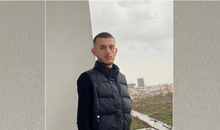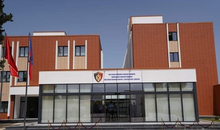
 Flash News
Flash News
Korça/ 40-year-old man jumps from fifth floor balcony, in critical condition
Croatia restores compulsory military service
Illegal constructions in Theth, Manja demands disciplinary proceedings against prosecutor Elsa Gjeli
Details from the murder of Renis Dobra, the perpetrators came with 2 Range Rover cars from Rrëshen
The Supreme Court left him in prison, Meta addresses the 'Constitution'
The executive and dependency institutions without transparency, delay requests for information

The executive and dependent institutions prevent the provision of information to the media in violation of the deadlines of the law "On the right to information", or by using the artifices of "trade secret" and "investigative secret" to keep it away from the media and public opinion. This fact is confirmed by the data of MediaLook, which has analyzed 125 requests for information sent to institutions for a 5-year period, during the years 2019-2023. Experts raise concerns about a centralization and lack of will of the holders of the institutions to make available the required information. However, the decisions of the courts in the cases "Hoxhaj vs. KPK" and "Rama vs. Taxes" enrich the local jurisprudence in favor of journalists for the "right to information".
The General Directorate of Prisons, an institution under the Ministry of Justice, refused in January of this year MediaLook's request to interview a woman convicted of being involved in a sexual abuse case without cameras. The latter would be asked to confirm some data proving the failure of preventive and rehabilitation agencies in Albania. The institution argued in writing that the regulation " prohibited filming and recording in the premises of prisoners as well as broadcasting live broadcasts from the premises of the institution ".
Two weeks later, the same institution, adhering to the same regulation, allowed the recording of a 55-minute report that propagated about the improved conditions, high security and life in the Peqin prison, with the head of this institution already tweeting resigned. It was broadcast in prime-time on the show "Opinion" .
MediaLook contacted the Directorate of Prisons and with an official letter asked for an explanation regarding the double standard in the interpretation of the regulation.
After refusing to respond within the deadline, forced by the Public Commissioner, the Directorate of Prisons evidences that the request for the realization of this production, which spoke of a "5-star" high security prison, was approved by Minister Manja himself. " The recording by the staff of the show "Opinion" has been accepted by the Minister of Justice, limiting the filming in the premises of the prisoners as well as interviews with them," says the official response of this institution. Meanwhile, despite this attitude, the report also shows interviews conducted with convicts.
The Directorate of Prisons goes even further! She clarifies that the requests for interviews are evaluated by the prison staff in the interest of the author of the crime, but also of " the negative impact they may have on the perception of the public ". This fact, in order to dictate the perception of public opinion, was also communicated "off record" to MediaLook journalists, in an attempt to explain the reasons for refusing an interview with a witness to one of the most serious sexual crimes against minors in Albania. a decision that tried to hinder the investigation.
The propaganda material, with the permission of the Minister of Justice himself, was an attempt to recover the institution's image. It was published almost two months after the tragic murder in the high security prison in Peqin, on December 15, 2023, where the prisoner Sokol Mjacaj managed to secure a pistol, with which he executed Arben Lleshi and held the kitchen staff hostage. of prison. This event was followed by a letter published in the media that the directors of Peqin prison had sent, on November 30, to the General Director of Prisons, Admir Abria, in which they stated that " the prison scanner is out of order, while some of life prisoners have been allowed to reconstruct the rooms by limiting controls and security elements for prohibited items ". The lack of these serious facts in the journalistic material was noted with concern by the journalist of the Black Chronicle, Spartak Koka in the studio, after the broadcast of the report.
The institutions of the executive, those dependent on him and those of criminal prosecution prevent the provision of information to the media, while they violate and exceed the deadlines in returning answers to requests for information, defined by the law "On the right to information".
MediaLook has analyzed a database of 125 requests sent by it for a 5-year period, during the years 2019-2023. It turns out that, out of 33 of them sent to the executive and dependent institutions, in 1/3 of the cases they were ignored and they did not receive any response within the deadline. These requests, even after complaints, have received incomplete answers.
The most egregious case is the information that MediaLook requested from the Ministry of Energy and Infrastructure regarding the compensation bill for televisions from the group of international experts on the release of the 700 MHz frequency band, after years of mismanagement of the situation by the Audiovisual Media Authority. The request was initiated on January 24, 2023, and after complaints to the Commissioner, a partial response was received on April 5, 2023, a full 71 days out of the 10 working days provided by law.
" Compensation from the state budget for each of the media operators is confidential and constitutes a trade secret", - it was said in MIE's response on the value of the compensation of each media from taxpayers' money for the release of the spectrum of frequencies, which is public property.
From the processing of the data, it is evident that the procrastination does not have an administrative character, but a tendency to not provide the requested information through formal answers or by hiding the latter abusively behind "investigative secret" or "commercial secret", especially when information is sensitive, creating bureaucratic obstacles for the media. In this particular case, MediaLook compiled a five-page justification arguing why the requested information does not constitute a "trade secret".

For the lawyer specialized in issues of freedom of the media and journalists, Dorian Matlija, " what is constantly established is that, regardless of the type of institution, the main factor is the type of information that is required. If you, as a journalist, seek information of a sensitive nature, you will face resistance from any institution, no matter how well this institution has behaved in the past ", - underlines Matlija, who is also the head of the Respublica Center that monitors and publishes reports. periodical on the right to information.
While the researcher and author of the annual report "Safe journalist Albania", Blerjana Bino, says that " the issue is not with the coordinators of the right to information, but with the general spirit and culture of the institutions, which is related to the great concentration of power, with secrecy, keeping information, not making proactive transparency and accountability which is related to the holders of the institution and even further to the Council of Ministers and the Prime Minister ".
The editor-in-chief of BIRN Albania, Besar Likmeta, one of the investigative media organizations, says that " there is a deterioration of the time and approach to the law "On the right to information" during the last years ". This fact is also ascertained from the data of MediaLook, where it is noted that besides the executive there are also the institutions of criminal prosecution, the Police and the Prosecutor's Office, with a daily average of returning the answer up to 28 days, or twice the time provided for in the law. It is noted that the Police has the highest number of requests without any response.
Meanwhile, the institutions that seem to respect the "right to information" the most are the courts. From the processing of data related to 51 requests for information sent, it results that in 49 cases the information received was complete in content, while the average daily response time was 12 days.

But beyond the time delays, what is viewed with the greatest concern by the leader of BIRN Albania, Besar Likmeta, is the standardization and centralization of information: " There have been cases where institutions in an organized manner return similar answers, where the request sent to different institutions , receive centralized response. This may be a consequence of the creation of the Media and Information Agency, which has a coordinating role, but which often seems to have a limiting role in terms of their access to public documents ", - says Likmeta. He analyzes that " even though this institution in theory aims to facilitate access to information from the media, our perception is that it has often become an obstacle in terms of requests from journalists or media institutions to have information or copies of official documents ... ".
The situation regarding the right to information from public institutions has been accepted as problematic even by Prime Minister Rama himself, although for more than ten years, the vast majority of the incumbents of this administration, who prevent citizens from being informed, have been appointed during his mandates. On June 26, while speaking at the VI National Conference on the Right to Information , Rama proposed the establishment of a National Monitoring Board, while adding that " for the most part, the problem is that there is no awareness of providing information in real time and this erodes the trust of citizens, this opens whole riverbeds for the sludge of disinformation", publicly admitting that the source of disinformation, for which he constantly accuses the media, is the lack of transparency and accountability on the part of public institutions.
The month of July 2024 turned out to be good for the media, journalism and the rights of journalists.
Two of the investigative reporters, Edmond Hoxhaj of BIRN Albania and Artan Rama, a freelance investigative journalist, won two processes that lasted for years, respectively three and seven years.
The case " Hoxhaj vs. KPK ", was the one that got the attention of the media and public opinion because of the sensitive information it carried. The Supreme Court ended a three-year process by overturning the claims of the KPK, this institution created as part of the justice reform package. In her decision, she gave the right to BIRN and journalist Edmond Hoxhaj regarding the publication of the name of the donor company, which covered the expenses of KPK members for an activity of this institution. The information kept secret for three years had a direct impact on the credibility of this institution, since for similar sponsorships, the members of the KPK themselves have given decisions on the dismissal of judges and prosecutors, during the vetting process.
The editor-in-chief of BIRN considers it of particular importance for the respect of a right enshrined in the Constitution: " The decision of the Supreme Court to uphold the decision of the Court of Administrative Appeals, given by judge Blerona Hasa, is of fundamental importance for as for the right to information and journalists, - underlines Likmeta.
For lawyer Matlija, this decision of the Supreme Court is " an enrichment of local jurisprudence ". According to him, " in the case in question, it was the Commissioner who made the right balance and ordered the publication of the information, and the courts of all levels supported this decision-making ". The head of the ResPublika Center emphasizes that the Supreme Court handled the case "Hoxhaj vs. KPK" with priority and not according to its usual rhythms, " following the jurisprudence of the European Court which emphasizes that the information sought by journalists is a "perishable commodity" and must be dealt with quickly .
Another important decision for the media landscape in the country and the freedom of journalists was the case " Rama vs. Taxes ". The Administrative Court of Appeal ended a 7-year legal ordeal by ruling in favor of journalist Artan Rama. The latter has asked the General Directorate of Taxes for documentation on the name list of insured employees in some of the largest TV stations in the country.

" Both decisions establish good practices and give signals to institutions in favor of information transparency", - declares researcher Blerjana Bino. However, according to her, the concern raised by journalists and civil society organizations remains the time to reach this positive decision. "The delay of three and seven years naturally affects the quality of information and the way citizens are informed about issues of public interest, not at the right time, but very late", Bino concludes .
Currently, according to law no. 119/2014 "On the right to information", non-implementation of the decision of the Public Commissioner is punishable by a fine, a penalty that is proving to be light for the violation of a constitutional right. " The threat of a fine is not enough, but the execution mechanism must be implemented by the bailiffs, who also have the criminal report in hand, if necessary ", - analyzes lawyer Matlija.
This legal change would not only strengthen the positions of citizens and journalists, but would curb the arrogant attitudes of some of the holders of the institutions to hide information and delay the "right to information"./ MediaLook
Latest news


Malltezi: SPAK admits, we are in a process that began with Balla's false report
2025-07-10 22:34:16

Si të çliroheni nga bllokimet emocionale me anë të ushtrimeve
2025-07-10 21:57:24

Lala: Veliaj wanted to return as mayor
2025-07-10 21:40:46

VIDEO/ Brawl in Bolivian parliament, deputies physically clash
2025-07-10 21:20:30


Albania experienced one of the longest heat waves of the last decade
2025-07-10 21:01:09

The Government approves new procedures for declaring residence in e-Albania
2025-07-10 20:39:32

Koka: Northerners will not forget Edi Rama's racist operation in Theth
2025-07-10 20:18:24
The 3 zodiac signs that will be most affected by the 'Full Moon' of July 10
2025-07-10 20:04:49
New director of the National Center of Cinematography appointed
2025-07-10 19:51:12
Korça/ 40-year-old man jumps from fifth floor balcony, in critical condition
2025-07-10 19:40:19
'Tired Woman'/ The Syndrome That Affects Thousands of Women Every Day
2025-07-10 19:34:02
Jane Birkin's original Hermès bag sells for $10 million
2025-07-10 19:26:22

Britain-Ukraine agreement signed for 5,000 Thales missiles
2025-07-10 19:00:25
Fire in Zvërnec, flames endanger two hotels
2025-07-10 18:57:19
Croatia restores compulsory military service
2025-07-10 18:39:01
Spahia: The great truth of the strong accusation of the residents of Theth
2025-07-10 18:35:07


The Supreme Court left him in prison, Meta addresses the 'Constitution'
2025-07-10 17:57:21
New punishment with 'new' regulations
2025-07-10 17:54:46
EU translator fired over fears for Zelenskyy's safety
2025-07-10 17:45:37
'You are a policeman, but not God, take my soul', protest for Agon Zejnullahu
2025-07-10 17:41:21


Video/ Rama repeats the scenario, kneels before Meloni again
2025-07-10 16:56:31
He set fire to a plot of olive trees, 50-year-old man arrested in Shijak
2025-07-10 16:46:19

Rubio: US and Russia have exchanged new ideas for Ukraine peace talks
2025-07-10 16:36:20
Death of 27-year-old, Lipjan Police Commander Resigns
2025-07-10 16:21:28
Video/ An apartment burns in Tirana near the New Bazaar
2025-07-10 16:09:36


Jensila lights up the internet with her birthday greetings to Ledri
2025-07-10 15:42:08
They're full of pesticides! List of 12 products we need to be careful of
2025-07-10 15:31:04

Worker falls from scaffolding in Shëngjin, urgently sent to Trauma
2025-07-10 15:11:03
Malltezi: Within one day they seized my accounts, properties and shares
2025-07-10 15:01:23
EU: Israel has agreed to more aid to Gaza
2025-07-10 14:55:19


Murder of Reni Dobra, 23-year-old's vehicle pulled from the water
2025-07-10 14:29:23
Trump's tariffs on Brazil raise coffee prices
2025-07-10 14:16:07
Ursula von der Leyen survives no-confidence vote
2025-07-10 14:04:27


Fire in Lezha, flames near electrical substation
2025-07-10 13:32:24
Residents clash with police in Theth, a woman faints
2025-07-10 13:24:38
"Rama and Xanun"
2025-07-10 13:15:46

Zodiac signs most likely to get divorced in July 2025
2025-07-10 12:45:51
A scapegoat for an illegitimate Republic
2025-07-10 12:35:02
"He has devastated his own nation"/ Berisha: Rama imprisons his opponents!
2025-07-10 12:26:54

Albanian man injured with knife in Italy
2025-07-10 12:08:55






23-year-old in Mat drowned with rope, 4 suspects are being held
2025-07-10 10:58:53

After the dismissals, the new director of the Shkodra Police is appointed
2025-07-10 10:30:10
BIRN: Rama's action for public spaces, a repeated spectacle
2025-07-10 10:29:11
Action in Theth, Shkodra Police leaders dismissed
2025-07-10 10:16:28
Fatal accident on the Tirana-Durres highway
2025-07-10 10:01:58
The incinerator does not exist, but the government continues to increase funds
2025-07-10 09:51:45
Albania is aging at a rapid pace! 30% of the population is over 60 years old
2025-07-10 09:46:23
End of an era, Modric says 'goodbye' to Real Madrid
2025-07-10 09:36:09
Mount Dukat has been on fire for 6 days, residents request air intervention
2025-07-10 09:27:24

"Poverty on the rise"/ DW: Many people in Germany are not getting paid
2025-07-10 09:08:06
Horoscope, what do the stars have in store for you today?
2025-07-10 08:51:59




The scorching heat returns, the thermometer climbs to 40°C
2025-07-10 07:58:52
Morning Post/ In 2 lines: What mattered yesterday in Albania
2025-07-10 07:46:35
Tourist operator in Theth: They are demolishing our houses without warning
2025-07-09 22:54:57

Trump and Israeli commander warn: Gaza ceasefire could be near
2025-07-09 22:13:21
Fire in Elbasan Landfill, pedagogue: It is a cancer and environmental crime
2025-07-09 21:54:47


Dangerous summer, number of snake bites increases
2025-07-09 21:22:13
Berisha appeals again: Stop state terror against the residents of Theth!
2025-07-09 21:15:36
'Kissing disease' virus linked to several forms of cancer
2025-07-09 21:04:44
Malltezi confesses after release: Justice has become a political weapon
2025-07-09 20:51:48
Vokshi: Albania's EU integration has stalled due to lack of free elections
2025-07-09 20:37:21
